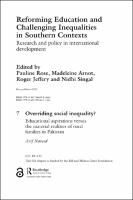Chapter 7 Overriding social inequality?
Proposal review
Educational aspirations versus the material realities of rural families in Pakistan
Abstract
This chapter draws upon 28 semi-structured interviews with the fathers, mothers and one of their sons and daughters (aged 25+) in eight families living in the same poor rural community in Punjab. It develops an understanding of a pentagonal social structure – a set of five key social relations (landownership, caste/kinship, patriarchy, religion and politics of patronage) that mediate life chances of individuals in and through schooling. By interpreting these narratives using a habitus listening guide (Naveed and Arnot 2019) drawing on Bourdieu’s (1977) theory, this chapter reveals how poverty and social inequality generate a range of differentiated values, meanings and aspirations amongst families with often detrimental effects on educational decisions and strategies. Arguing against the efficacy of the ‘supply-driven’ educational reforms, this chapter points towards the apparently agentic, yet socially structured, decision-making of the poor as one of the key sites of the reproduction of educational inequality. It suggests that in the absence of wider social and economic reforms aimed at equalising economic opportunities, socially disadvantaged groups have little to gain from investing in schooling as the levels and quality realistically achievable for them do not necessarily offset their prior disadvantage.


 Download
Download